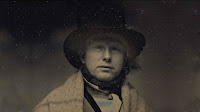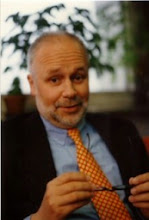He was a great man, an honest man, and served his country well and was an honor to it. Also, he was a good-natured man, but abrupt with strangers if they annoyed him when he was busy. He was profane, but that is nothing; the best of us is that. I did not know him well, but only just casually, and by accident. I never met him but once. I called on him in the "Tribune" office, but I was not intending to. I was looking for Whitelaw Reid, and got into the wrong den. He was alone at his desk, writing, and we conversed-not long, but just a little. I asked him if he was well, and he said, 'What the hell do you want?' Well, I couldn't remember what I wanted, so I said I would call again. But I didn't.
So beschreibt Samuel Clemens, den wir als Mark Twain kennen, sein einziges Zusammentreffen mit dem berühmtesten Journalisten seiner Zeit. Er hat ihn häufig in sein Werk hineingeschrieben. Wie zum Beispiel in das zwanzigste Kapitel von Roughing It und in manche Kurzgeschichten. Wenn Mark Twain kleine Witzchen über Horace Greeley machte, so verstand das damals jeder seiner Leser. Denn jeder kannte Greeley. Heute kennt ihn kaum einer mehr, man weiß nur noch, dass er Go West, young man and grow up with the country! gesagt hat. Oder auch nicht.
Journalisten, so berühmt sie in ihrer Zeit sein mögen, werden schnell vergessen. William Cullen Bryant, der zweite große New Yorker Journalist neben Greeley, ist der amerikanischen Nation mal gerade noch als Dichter in Erinnerung. Das sah auch Vernon L. Parrington so, als er in seiner dreibändigen Kulturgeschichte Main Currents in American Thought (dem Beginn der American Studies in Amerika) schrieb: Horace Greeley has suffered far more disastrously than Bryant the common fate of journalists, yet his place in nineteenth-century America was too important and his influence on current democratic ideals too great, to be carelessly ignored. Man kann das kleine Portrait Horace Greeley: Yankee Radical im fünften Kapitel des zweiten Buches heute immer noch mit Gewinn lesen. Man kann auch heute noch immer Parringtons Kulturgeschichte mit ihren 1.400 Seiten lesen. Sie ist, ebenso wie Robert E. Spillers Literary History of the United States und Daniel Boorstins The Americans, um Längen besser als vieles neumodische Zeug.
Dieser Horace Greeley, der heute vor zweihundert Jahren geboren wurde, ist schon zu Recht ein berühmter Mann. Er folgte in seinem Handeln keiner Ideologie, er ist einfach nur ein Verfechter des common sense. Er ist auch ein politischer einflussreicher Mann. Am 22. August 1862 erhält er einen Brief des Präsidenten, adressiert an den Honourable Horace Greeley, in dem diese berühmte Passage steht:
I would save the Union. I would save it the shortest way under the Constitution. The sooner the national authority can be restored; the nearer the Union will be "the Union as it was." If there be those who would not save the Union, unless they could at the same time save slavery, I do not agree with them. If there be those who would not save the Union unless they could at the same time destroy slavery, I do not agree with them. My paramount object in this struggle is to save the Union, and is not either to save or to destroy slavery. If I could save the Union without freeing any slave I would do it, and if I could save it by freeing all the slaves I would do it; and if I could save it by freeing some and leaving others alone I would also do that. What I do about slavery, and the colored race, I do because I believe it helps to save the Union; and what I forbear, I forbear because I do not believe it would help to save the Union. I shall do less whenever I shall believe what I am doing hurts the cause, and I shall do more whenever I shall believe doing more will help the cause. I shall try to correct errors when shown to be errors; and I shall adopt new views so fast as they shall appear to be true views.
I have here stated my purpose according to my view of official duty; and I intend no modification of my oft-expressed personal wish that all men every where could be free.
Yours,
A. Lincoln.
Das mit dem Satz If I could save the Union without freeing any slave I would do it ist wohl nicht so ganz wahr, denn er hat die Emancipation Proclamation schon in der Schublade liegen. Horace Greeley hat sich auch immer wieder als Politiker versucht. 1872 hat er für die Präsidentschaft kandidiert. Aber wird Amerika jemanden wählen der für die Sklavenbefreiung, die Emanzipation der Frauen, den Sozialismus und für die Vegetarier gekämpft hat? Selbst wenn die Regierung von Ulysses S. Grant von der Korruption angefressen war, wählen die Amerikaner doch den Ex-General ein zweites Mal. Die Stimmen sind noch nicht ausgezählt, da ist Horace Greeley schon tot. Was ihm im Jahre 1872 zugestossen ist, wer hätte es verkraftet? Ein Betrüger namens Philip Arnold hatte ihn um sein Geld gebracht, seine Frau war gestorben, sein Konkurrent Whitelaw Reid hatte sich in den Besitz seiner Zeitung gesetzt - und dann auch noch die verlorene Wahl.
Kurz nach der Wahl erläutert er einem Bekannten die Gründe für seine Niederlage: Well, Governor, I will tell you how I came to be defeated. The facts are plain. I was an abolitionist for years, when it was as much as one's life was worth even here in New York, to be an abolitionist; and the negroes have all voted against me. Whatever of talents and energy I have possessed I have freely contributed all my life long to Protection; to the cause of our manufactures. And the manufacturers have expended millions to defeat me. I even made myself ridiculous in the opinion of many whose good wishes I desired by showing fair play and giving a fair field in The Tribune to 'Woman's Rights;' and the women have all gone against me! So selbstironisch oder zynisch das klingen mag, es ist wahrscheinlich wahr. Da ist er auch noch sein altes kämpferisches Selbst. Aber wenig später wird er von einer Enzephalitis dahingerafft.
Die New York Times schreibt in der heutigen Ausgabe nichts über den 200. Geburtstag von Horace Greeley. Immerhin gibt es einen Blog, der heute an ihn erinnert. Was wären wir ohne die Blogs? Es wäre Amerika zu wünschen, wenn es mehr Journalisten vom Schlage Horace Greeleys hätte und weniger Sender vom Schlage der Fox News.


Keine Kommentare:
Kommentar veröffentlichen